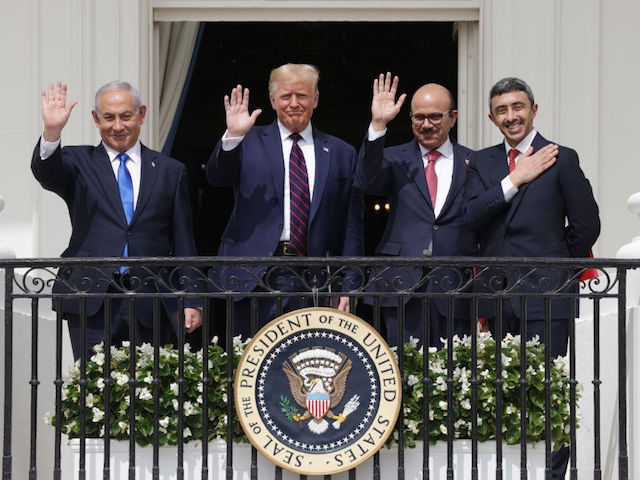
As the 2024 election approaches, the Biden-Harris administration’s foreign policy has left the world in utter chaos and teetering on the brink of World War III — from the disastrous Afghanistan withdrawal to the Israel-Hamas war — all while Russia, China, and Iran, once restrained under Trump’s tough stance, are emboldened, raising concerns that a Harris term would spell irreversible disaster.
The post Biden-Harris Policies Ignited Global Chaos: WW3 Fears Rise as 2024 Election Nears appeared first on Breitbart.
As the 2024 election approaches, the Biden-Harris administration’s foreign policy has left the world in utter chaos and teetering on the brink of World War III — from the disastrous Afghanistan withdrawal to the Israel-Hamas war — all while Russia, China, and Iran, once restrained under Trump’s tough stance, are emboldened, raising concerns that a Harris term would spell irreversible disaster.
Since taking office, the Biden-Harris administration has made a series of failed foreign policy moves, many of which have shifted long-standing U.S. strategies. President Joe Biden himself recently underscored Vice President Kamala Harris’s involvement in such decisions, describing her as “a major player in everything we’ve done,” as he directly tied her to their administration’s policy failures.
In fact, last month Biden admitted he had delegated “everything” as commander-in-chief to Harris, including both foreign and domestic policy, a significant admission as Harris has repeatedly attempted to distance herself from the administration’s record.
Meanwhile, Trump senior adviser Jason Miller stated that Harris is directly responsible for the current administration’s failures, particularly on foreign policy, citing her involvement in decisions that led to disastrous results from Afghanistan to Ukraine and the Middle East.
With 8 out of 10 Americans fearing World War III, the Biden-Harris administration faces growing scrutiny over its handling of foreign crises.
Middle East
One of the current administration’s first major foreign policy moves was removing the Houthis from the Foreign Terrorist Organization (FTO) list, reversing Trump-era policies aimed at curbing the Iranian-backed group. Though the president would later admit the Houthis are “terrorists,” it would come only after dozens of attacks against U.S. military and international commercial warships in the Red Sea.
The decision to delist the Houthis as an FTO was seen as part of the Biden-Harris administration’s broader attempt to revive the failed Obama-era Iran nuclear deal (JCPOA), which has been widely criticized for empowering Iran, the largest state sponsor of terrorism worldwide. The current administration has further emboldened Tehran and its terror proxies through the easing sanctions and by providing the Islamic Republic with financial resources to support terrorism and regional aggression.
Additionally, weak responses to attacks by Iranian-backed militias and policy shifts in the Middle East have been viewed as “appeasing” the theocratic regime. The Biden-Harris administration also allowed sanctions on Iran’s ballistic missile to expire last year, a mere six months before a ballistic missile attack on Israel in April. According to a report citing new government data from last week, the Biden-Harris administration gave the Iranian regime access to $200 billion in oil revenues through lax sanctions enforcement.
While under Trump, a “maximum pressure” sanctions campaign crippled Iran’s ability to finance proxy terror groups like Hezbollah and Hamas, the Biden-Harris administration’s diplomatic overtures — including efforts to renew the nuclear deal and a more lenient stance on enforcing oil sanctions — have allowed additional revenues to flow to Tehran, enabling it to continue funding terror through its regional proxies.
The consequences came to a head in October 2023 when Hamas, heavily funded by Iran, launched a large-scale assault on Israel which left 1,200 dead inside the Jewish state, over 4,800 more wounded, and at least 240 hostages of all ages taken — of which nearly one hundred remain captive. The vast majority of the victims are civilians and include dozens of American citizens.
The war shocked the region, with critics pointing to the Biden-Harris team’s failure to maintain the hardline pressure Trump applied to Tehran. Former Secretary of State Mike Pompeo warned that the current administration’s “weakness” emboldened Iranian proxies, leading to catastrophic consequences across the Middle East.
The ongoing Israel-Hamas war has also highlighted the strained U.S.-Israel relations under the Biden-Harris administration, which began with his administration showing early hostility toward Prime Minister Benjamin Netanyahu by delaying official meetings. In fact, the administration has reportedly been using a four-part plan, involving diplomatic pressure and protests, to undermine Netanyahu’s government, signaling an unprecedented interference in Israeli domestic politics during a critical war.
In May, Secretary of Defense Lloyd Austin confirmed that the U.S. had withheld a shipment of large bombs to Israel, citing concerns about civilian safety in Rafah during Israel’s ongoing operations against Hamas. In a more recent development, the Biden-Harris administration is reportedly considering an arms embargo on the Jewish State over humanitarian concerns in Gaza, with Harris signaling openness to the idea.
The administration’s executive order which sanctions Israel under the pretext of targeting “extremist settler violence,” empowers the anti-Israel BDS movement and undermines a critical U.S. ally during a time of crisis.
In July, the Republican Jewish Coalition (RJC) condemned Harris for boycotting Netanyahu’s address to Congress to attend a sorority luncheon, viewing it as a clear signal of hostility toward Israel. Critics argue that it was part of a broader pattern in which Harris has consistently aligned with anti-Israel sentiments, even expressing support for the “emotion” behind protests that have involved overt antisemitism.
[embedded content]
This contrasts with Trump’s full support of the Jewish State, exemplified by his decision to move the U.S. embassy to Jerusalem and the historic Trump-brokered Abraham Accords — peace agreements normalizing relations between Israel and several Arab nations, stabilizing a volatile region, all while avoiding new foreign wars during his presidency.

Afghanistan
The 2021 Afghanistan withdrawal is perhaps the most glaring example of Biden-Harris foreign policy failures, a move that left major U.S. allies questioning the reliability of American commitments, ultimately leading to further global instability.
What was supposed to be a strategic exit from America’s longest war turned into a hasty, disorganized retreat, leaving the country to be swiftly overtaken by the Taliban. The resulting humanitarian disaster and the deaths of U.S. service members during the evacuation were only part of the fallout.
Many blasted the Biden-Harris administration’s “weakness” and “incompetence” while accusing the president of allowing Taliban terrorists to “call the shots” by “dictating foreign policy” and calling for his immediate resignation.
As fighting intensified in Afghanistan, the Biden-Harris team set a withdrawal timeline while assuring that the U.S.-backed Afghan military could withstand the Taliban, but within weeks, Kabul fell, President Ashraf Ghani fled with $169 million, and the Taliban swiftly seized control of the country despite nearly two decades of U.S. and NATO efforts to build Afghan security forces.
A report by the Special Inspector General for Afghanistan Reconstruction found that the withdrawal left $7.2 billion worth of U.S. military equipment in the hands of the Taliban, including missiles, aircraft, and biometric devices. Some of the weapons even reportedly ended up in the Gaza Strip, with groups like Hamas potentially utilizing them.
A recent report by the House Foreign Affairs Committee that slams the Biden-Harris administration for prioritizing the optics of the Afghanistan withdrawal over the safety of U.S. personnel, specifically highlights Harris as a key player in the decision-making process. In fact, Harris even admitted she was “the last person in the room” when Biden decided to abruptly evacuate U.S. troops from Afghanistan, boasting of her support for the disastrous decision, while expressing admiration for the president’s supposed courage in making the call.
At the time, former President Trump said the Biden-Harris team “surrendered Afghanistan to terrorists and left thousands of Americans for dead.” The former president also called the bungled withdrawal the “single most embarrassing moment in the history of our country.”
The success of the Taliban, which immediately declared its intentions of imposing a strict Islamic sharia law system on Afghans, has been a growing concern for various groups, including ethnic and religious minorities within Afghanistan.
Furthermore, the Biden-Harris administration faced backlash for a botched drone strike in Kabul, which killed 11 civilians, further tarnishing the U.S. reputation. The withdrawal also exposed failures within the State Department, whose evacuation efforts left thousands of Afghan allies behind, now facing life under Taliban rule.
Former Defense Secretary Robert Gates remarked that Biden has been “wrong on nearly every major foreign policy issue” in the last 40 years, a sentiment clearly validated by the Afghanistan debacle.
Russia-Ukraine War
The mishandling of the withdrawal also emboldened adversaries like Russia and China, with then-House Speaker Kevin McCarthy (R-CA) asserting that the actions of the Biden-Harris administration, together with their executive orders, have “emboldened all the evil leaders of the world.” The chaotic pullout signaled U.S. vulnerability, leading experts to argue that President Vladimir Putin saw it as a display of weakness, paving the way for Russia’s more aggressive actions.
Colonel Richard Kemp, former commander of British forces in Afghanistan, argued that Putin’s invasions of Crimea in 2014 under Obama and Ukraine in 2022 under the Biden-Harris administration demonstrate that “two weak presidents” emboldened Putin, further linking the current conflict to the “humiliation of the United States.”
The now nearly three-year-long Russian invasion of Ukraine underscores the Biden-Harris administration’s mishandling of U.S. deterrence.
The president’s now infamous comment about a “minor incursion” by Russia into Ukraine, made in early 2022, sent the wrong message to Putin, with the indecision emboldening Moscow to launch a full-scale invasion of Ukraine.
Initially, the Biden-Harris team even offered Ukrainian President Volodymyr Zelenskyy a ride out of the country instead of providing the military support Ukraine desperately needed. Such decisions have not only deepened the crisis but also led to widespread criticism of the president’s lack of foresight in managing Europe’s security situation.
U.S. weakness under Biden-Harris stands in sharp contrast with Trump’s foreign policy, where under his watch, Putin refrained from aggressive moves.
Trump has argued that if Harris wins, she would prolong the Russia-Ukraine war and continue funneling billions of U.S. tax dollars into Ukraine, warning that her inaction could lead to “millions” of deaths and potentially a global conflict.
China
The Biden-Harris administration’s approach to China has been similarly criticized, with current policies seen as lacking, and Beijing emboldened by American inaction.
From the infamous spy balloon incident, where a Chinese surveillance balloon was allowed to traverse U.S. airspace, to rising military threats in the South China Sea and over Taiwan, the current administration’s responses have been criticized as inadequate, including the failure to impose sanctions on Beijing.
China’s assertiveness, having grown, has led to fears that Taiwan could be the next flashpoint of major conflict.
Under Trump, the U.S. took a much harder stance on China through tariffs and aggressive diplomacy. Trump’s administration also built stronger alliances with nations in the Indo-Pacific, sending a clear message to Beijing that any aggressive moves would have serious consequences.
Global Threats
Beyond these major crises, the Biden-Harris administration’s foreign policy blunders span numerous regions.
North Korea, for instance, has openly resumed arms deals with Russia, further straining global security dynamics. The current administration’s failure to rein in Iran has allowed Tehran to infiltrate U.S. politics, raising alarms about Iran-backed operatives influencing domestic policy.
Meanwhile, Russia’s development of hypersonic missiles has gone largely unchecked, marking a dangerous escalation in the global arms race.
Trump’s foreign policy, in contrast, was defined by a doctrine of deterrence.
The assassination of Iranian General Qasem Soleimani impaired Iran’s ability to conduct terrorist operations across the Middle East. Trump also maintained a strong military presence to dissuade North Korea and China from expanding their militaristic ambitions. His method of diplomacy and maintaining U.S. dominance globally led to a far more stable international environment.
Elections
As the 2024 election nears, foreign policy remains pivotal. While the Biden-Harris administration’s approach has been seen as “emboldening America’s enemies,” Trump is credited with maintaining global stability through strength and clear red lines.
Meanwhile, Harris failed her foreign policy efforts in Central America, as China expanded its influence in the region, and promised investments through her initiatives fell far short of expectations. Other key events include the terminating of Keystone XL, which hurt U.S. energy independence, and green-lighting the Nord Stream 2 pipeline — moves that undermined U.S. leadership globally.
Surrounded by advisers with anti-Israel ties, including her national security adviser Phil Gordon, who is currently under investigation for alleged links to an Iranian influence network, Harris faces increasing scrutiny over her foreign policy team.
Just last month, Harris claimed that no active-duty U.S. troops were engaged in combat; however, U.S. forces remain deployed in Iraq and Syria, facing frequent attacks from Iran-backed militias — prompting more concerns about her grasp of the complexities required for effective foreign policy leadership
Furthermore, she published a policy page on her website, claiming she is “ready to be Commander in Chief on day one,” but cited a notorious foreign policy blunder — mistakenly referring to North Korea as a U.S. ally during her 2022 visit to the Korean Demilitarized Zone — as evidence of her diplomatic experience.
[embedded content]
The Biden-Harris administration has also been blamed for contributing to the military’s largest recruitment crisis in decades, with critics pointing to the administration’s focus on “woke” policies like diversity initiatives as a key factor.
In addition, the current administration is also grappling with massive illegal immigration across the southern border — thanks to the repeal of Trump-era border policies and an economy strained by inflation.
In her role as “Border Czar,” Harris has been blamed for the administration’s failure to enforce immigration laws, which critics argue has compromised national security and led to preventable crimes. Unprecedented crossings of individuals on terrorist watchlists have also been documented at both the southern and northern borders, with some reportedly planning attacks.
“The Biden-Harris administration has intentionally left us vulnerable,” declared Rep. August Pfluger (R-TX), during a hearing on terror threats from the border, emphasizing the connection between their border policies and the surge in national security risks.
With tensions rising across the Middle East, Europe, and Asia, voters face a critical choice: continue the failed Biden-Harris policies or return to Trump’s assertive policies to restore U.S. leadership. with a recent survey revealing that 80% of Americans fear World War III is imminent, the stakes for U.S. foreign policy couldn’t be higher.
Joshua Klein is a reporter for Breitbart News. Email him at [email protected]. Follow him on Twitter @JoshuaKlein.




